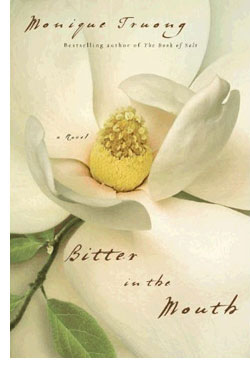 |
 |
 Monique Truong
Monique Truong
Bitter in the Mouth
Reviewed by: Rick Kleffel © 2010
Random House
USA Trade Hardcover, First Edition
ISBN 978-1-400-06908-8
Publication Date: 09-14-2010
304 pages, $25
Date Reviewed: 10-01-2010
Index:
General Fiction
Linda Hammerick is returning to Boiling Springs, North Carolina. It's her childhood home, a small town in the south where she grew up, mostly under the gaze of her great-uncle, "Baby" Harper Evan Burch. He was the adult she connected with, looked up to, fell in love with as she experienced the world, and the words in the world.
Linda's experience of words is not that most of us share. But it is one that author Monique Truong shares with readers in her evocative and powerful southern Gothic, 'Bitter in the Mouth.' Troung's second novel is the sort of reading experience that lingers in the mind, that readers will find themselves revisiting after they've finished. Truong knows how to remake the world with words.
The southern Gothic is a form that has a wider range than one might suspect, and Monique Troung mines that range with gorgeous language, rich characters and a wonderfully complex plot that upends not just our vision of her novel but of language as well.
As the novel begins, 'Bitter in the Mouth; plays out as a straightforward — then back — memoir of Linda's years growing up in Boiling Springs. She knows that she's different, because she does not just hear words. Some words have what she calls "incomings," tastes associated with word. Until she learns how to control, or at least mute their impact on her, she's held back, her natural intelligence checked by sensory overload. Burt even once she learns to live with her synaesthesia — the name of the neurological disorder from which she suffers — she also has to learn to live within the complexities of her family.
'Bitter in the Mouth' is a gorgeously written, intensely sensual Southern Gothic. It runs to the surreal, but is not so hard-edged as the work of Flannery O'Connor. Instead, Truong trends towards the more gentile styles of Harper Lee. Trends is the operative word here, because Truong is sharper, and the emotional range is more sensual, more severe than it is sentimental. Because Linda's experience of the world is moderated by her experience of words, Truong's prose takes center stage, and earns the spotlight. This is an evocative, sometimes perilously immersive reading experience.
But as important as the prose is to the novel, the plot proves to be equally well crafted and intricate. Truong pulls the reader effortlessly back and forth through Linda's life, where small events prove to compel our attention. For all the weaving and memoir-like stories of family and her past life, the narrative is quite tightly woven across two days. But those two days unfold like a hall of mirrors and our expectations can be upturned with a single sentence.
Truong's fictional family is revealed in layers, and the characters we meet here are utterly engaging, the sort apt to pop up in our reading memories and tell us something we may or may not want to hear. Baby Harper is a dapper, mysterious delight. Linda's mother, DeAnne, is stern, laconic and tightly wound, in contrast to her grandmother, Iris, the sort of grand personality that presides over every scene she enters. Much of the story takes place in letters between Linda and her best friend Kelly, who becomes a sister-of-choice.
Though the story is told entirely by Linda, there's a sort of harshness at work here, a wiry strength that pervades the plot, the prose and the characters. Linda's life, our lives, are seen foreshadowed in the future and with the prescience of the past. Troung's story, Linda's story, of how we come to understand who we are, of how our words can both define and undo our definition of ourselves. Truong reminds us that our lives are a combination of story and memory, of selective editing and sensual immolation. Every moment brings with it the potential for a new incoming, a new synthesis of language and sensuality that can undo all the stories we have ever told ourselves.
|
 |
|
|
 |
| |
Review Archive
All Reviews alphabetized by author.
General Fiction
Non-Genre, general fiction and literature.
Horror
Supernatural fiction, supernatural horror and non-supernatural horror.
Science Fiction
Science fiction, science fantasy, speculative fiction, alternate history.
Fantasy
Fantasy, surrealism and magic realism.
Mystery
Crime, thrillers, mystery, suspense.
Non-Fiction
Non-Fiction, True Crime, Forteana, Reference.
Poetry
|
|
 |
|




